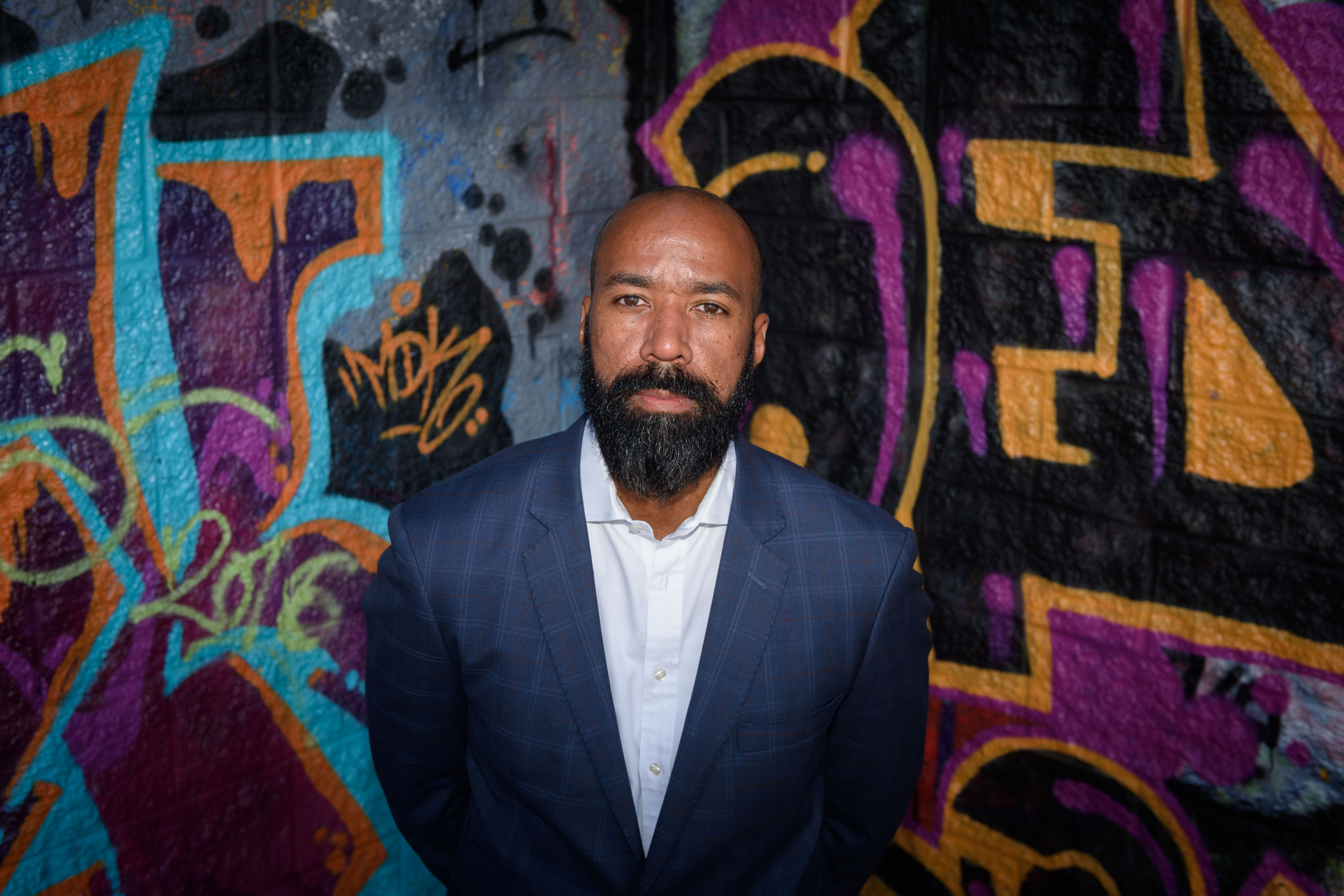The Instructor
Jeffrey Ogbar was 10 years old when hip-hop first hit the Top 40 charts (Sugarhill Gang, “Rapper’s Delight,” 1979). He was captivated by the beats and rhythms and lifestyle. As a teen, he tried to learn to breakdance. He took up spray paint as a graffiti artist. Eventually, his passion turned to academia. “When I was 19, 20 years old,” he says, “my dream was to pursue a Ph.D. and be a scholar.”
The author of Hip-Hop Revolution: The Culture and Politics of Rap (2007, University Press of Kansas), Ogbar has been teaching at UConn since 1997. He is a professor of history and director of the Center for the Study of Popular Music. Prior to founding that interdisciplinary institute in 2014, he served in a number of administrative positions – vice provost for diversity, associate dean for the humanities in the College of Liberal Arts and Sciences, and director of the Institute for African-American Studies, now known as the Africana Studies Institute.
“Working in administration was rewarding,” says Ogbar, “but with teaching, well, I sometimes feel guilty that I enjoy myself so much. You might sense my enthusiasm when I talk about hip-hop.” Indeed!
Class Description
“Hip-Hop, Politics, and Youth Culture in America” explores the history of rap music and its artistic antecedents, from minstrelsy to ragtime to jazz, and traces the popular genre’s influences in addressing race, class, and gender. The landscape in the course, which Ogbar has taught since 1998, is constantly reshaping.
“I had no idea we would address gentrification in cities,” says Ogbar. “We now have discussions on that, as well as health care inadequacy. These are matters that rappers get into.” The same cannot always be said for artists in other genres, even those favored in affected communities.
Students tell me they had no idea this music was so cerebral. — Jeffrey Ogbar
“Go through the Top 10 of soul and R&B in the 1980s, from Luther Vandross to Marvin Gaye, and you’ll find love songs that are absolutely silent on important issues,” says Ogbar. “But then hip-hop emerged, fearlessly and unapologetically reflecting on our society.”
The class delves beneath the misogyny and homophobia on the surface of some rap to unearth literary gymnastics, deconstruct metaphors and subtexts, and analyze the creation of rhymes.
One exercise Ogbar finds illuminating is showing video of, say, Robert Frost reading a poem at the Kennedy inaugural – “standing still at the podium, his papers blowing in the wind, trying to read his 80 words” – and asking students to compare it to a rap performance, Drake or Eminem “charismatic onstage, reciting hundreds of words from memory, riding in and out of the beat.” This inspires the class to reimagine poetry and literary work in both oral and written form.
“Students tell me they had no idea this music was so cerebral,” says Ogbar.
Ogbar’s Teaching Style
“What does Yoda have to do with hip-hop?” When Ogbar introduced the “Star Wars” character on the first day of class one recent semester, his students were baffled. Then he went on to explain how Luke Skywalker was in search of a Jedi knight when he encountered this small creature, feeble in appearance.
“You don’t expect a fierce fighter to come in that package. You don’t expect courage and bravery,” says Ogbar. “Likewise, in the 1970s people didn’t expect genius in the form of young black and brown dudes in the south Bronx. Yet out of that poor and violent community emerged a cultural juggernaut the likes of which the world has never seen.”
Unexpectedly outside the box, the professor’s example was.
Why We Want to Take It Ourselves
Unlike a survey of ancient China or Colonial America, this is living, breathing history. Ogbar cites the Tunisian rapper El Général, who as recently as the fall of 2010 released “Rais LeBled,” which decried poverty, unemployment, and other social injustices in his country, laying the blame on the authoritarian leader Zine El-Abidine Ben Ali.
The unapologetic rapper was arrested, sparking protests in the streets that led to the downfall of the Ben Ali regime. This spirit of democratic revolution spread throughout North Africa and the Middle East, becoming a movement known as the Arab Spring.
“This was history unfolding right in our midst,” says Ogbar. “And it wasn’t country music, it wasn’t jazz that got those people out in the streets. In many popular art forms, when someone says or does something offensive, they’ll pull back and apologize. There’s none of that temerity in hip-hop. There’s something about the politics of rap that enables an emcee to say what he says and not back down.”



